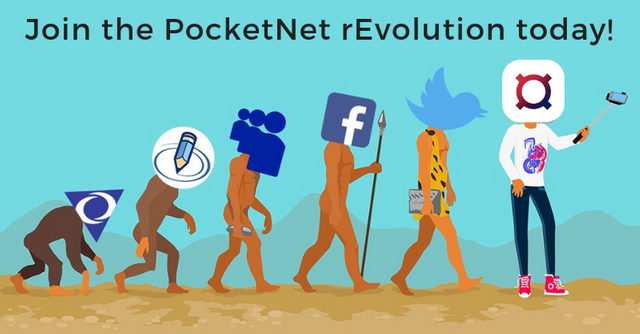PocketNet: A Truly Decentralized Open Sourced Content Discovery & Social Platform Based on Blockchain

Internet platforms have unlocked incredible amount of value by efficiently bringing together creators and consumers of goods, services and virtually any kind of content. However, those platforms are losing users due to variety of privacy issues and scandals inherent in extreme centralization. It is now abundantly clear that virtually all of the power and wealth in the current internet landscape is concentrated in the hands of the very few and they lack the motivation to spread that wealth. That power is wielded to protect moots, monopolize, exploit profitable creators (which now have little choice due to monopolization) and arbitrarily censor.
Pocketnet brings the foundations of Bitcoin to the world of internet platforms. All of the enormous value created by the platform is shared among players in the Pocketnet ecosystem in a transparent predictable way. No centralized entity exists that can disenfranchise creators by reducing their share of pay after they achieve success. Each creator earns an amount of Pocketcoin emission proportional to the success of their contributions to the platform. In addition, Pocketnet Direct Marketplace for self-serve advertising allows ad buyers to buy advertising from specific creators using trustless multisignature transactions. Ads can be predesigned or custom placement, where creator has freedom in presenting the ad. This is different from traditional platforms where vast majority of wealth is now clawed back by the shareholders of platforms.
Pocketnet is built to have elements comparable to current successful platforms such as Google, Twitter, Facebook, Reddit, Snapchat, Patreon and Wikipedia along with completely new features. Illegal content policing is done by platform creators who are verifiably invested in the success of the platform. This whole package of publishing, peer-to-peer communication, money transfers, internet search is based on equal nodes running the Pocketnet blockchain and the possibility of building multiple interfaces to suit needs of different users. As exodus from traditional corporate publishing and social platforms accelerates, users will look for platforms where they own content, subscribers and monetization channels.
Current State of Internet
Enormous profitability of current internet platforms is based on efficiency inherent in the platform design, but efficiency rewards are increasingly gated and passed to owners of the platform leaving participants with only scraps and no voice in running the platform. Creators’ earnings are not growing nearly as fast as the value created (and value of the platforms), algorithms are changed arbitrarily to create new sources of revenue for the platform and disenfranchise users. Platforms collect ever increasing amounts of personal information which results in regular breaches and abuse. At the same time, quasi-monopolistic power of platforms allows them to police speech in arbitrary ways, referring simply to fine print in Terms of Use[1] without so much as an explanation. A picture is worth a thousand words and there is no better illustration of the essence of centralized platforms than in this graphic, courtesy of Chris Dixon.

Source: https://medium.com/s/story/why-decentralization-matters-5e3f79f7638e
Pocketnet Blockchain
So, how can we solve this problem? By opening up the platform. Pocketnet blockchain is run by equal nodes, similar to any decentralized cryptocurrency. However, in addition to typical cryptocurrency token transfers, there are transactions that allows users to post content, vote for its quality, promote it and subscribe to creators (including private subscriptions that are encrypted and seen only by the subscriber). The login to the Pocketnet platform is simply the private key converted to 12 key words. User can interact with the blockhain using that private key. There are several advantages to such a blockchain approach. As mentioned above, the first is economic decentralization that allows for maximal sharing of value with creators who are the ultimate producers of value. Secondly and surprisingly, it is usability. Using a blockchain enables the user to log in from any front end interface on any device with their private key and immediately pull in all of the personalized settings from the blockchain (whether they are encrypted or public). Typically, the weakness of decentralized platforms and strength of centralized ones was this ability to log in from any device/browser without losing the benefits of personalization.
Pocketnet blockchain is based on randomized Proof-of-Stake algorithms. However, nodes are required to perform a number of services in order for their stakes to be valid. Nodes maintain the blockchain, they also respond to RPC socket calls from the front end.
[1] To be sure, we are not here arguing that platforms should not fight illegal content. Pocketnet has a built-in structure of policing content by those that are most invested in the success of the platform, namely the creators of content.
To be continued…